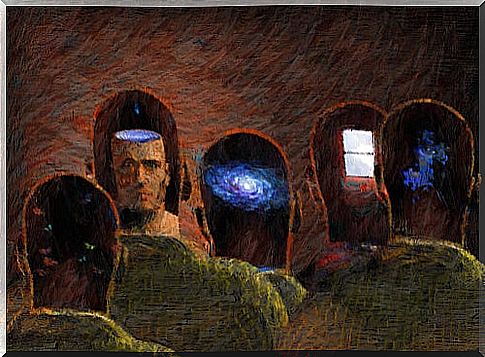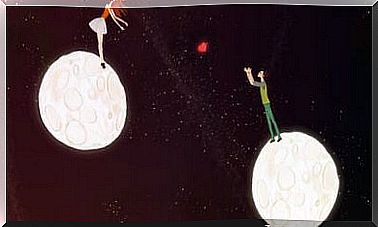4 Therapeutic Metaphors For Depression That Will Make You Think

Therapeutic metaphors for depression are frequently used in approaches such as acceptance and commitment therapy. Their objective is to ensure that the patient has a different perspective of their situation and can analyze their reality in a more profound, thoughtful and original way.
It should be noted, of course, that these linguistic resources will not make the person overcome their depression overnight. It is one step, one more strategy in the set of tools that a psychologist has at his disposal to favor the therapeutic process with his patient. However, it is interesting to see its effect.
Likewise, no matter the age of the person, these dialectical exercises awaken ideas, invite confrontation and often even break negative thinking patterns.
One of the true gurus of therapeutic metaphors is undoubtedly Sheldon Kopp. In his book Therapeutic Metaphors of a Psychotherapist , he collects a wide assortment of these resources. Also George W. Burns provides us with a deep and more recent work on this topic in his book
These types of strategies have been in use for decades. In fact, Milton Erickson, a pioneer in making use of muscle relaxation and hypnosis in the therapeutic process, used to point out that therapeutic metaphors could never be absent from his sessions. It was a way to “turn on” the patient’s mind, to position him in situations that could generate a confrontation and a discovery …

Therapeutic metaphors for depression
A first thing to keep in mind about therapeutic metaphors for depression is that, at times, they may not be helpful. They will not be if the patient suffers, for example, from major depression and is unable to attend, focus attention and carry out a process of reflection.
Therefore, everything will depend on how the person is at a given moment, something that the professional must value. Let’s see what kind of metaphors can be useful in these cases.
1. The metaphor of the swamp
Imagine that your purpose in life is to conquer the top of a beautiful mountain. Now, when you start your journey to that magical destination, you suddenly come across an obstacle: a swamp. You fall into it, your feet sink, it tries to move forward but with each step you notice how you go deeper into that cold mud.
Reflection⇒ In the journey of life we are forced to overcome obstacles. Depression is one more part of the road to your personal fulfillment, to the top of that mountain. Whether you like it or not, you are forced to get out of that swamp to keep walking to your top. It is one more process, one that sooner or later you will end up with the help of therapy.
2. The metaphor of the gargoyle
Depression is like carrying a heavy gargoyle on your shoulder. A stone that constantly whispers to you how little you are worth, the darkness of everything around you. He is skilled at bringing fatalities to you almost every moment and worst of all is that that gargoyle never shuts up and weighs more and more on you.
Reflection⇒ you must take power away from that gargoyle, remove it from your shoulder, from your life. That creature that whispers to you is your internal dialogue, that psychological dimension that you must begin to control, to sanitize, to put in your favor.

3. Therapeutic metaphors for depression: the light switch
Among the therapeutic metaphors for depression, the one referred to by light is one of the most interesting. In this case, the idea of negative thoughts comes into play again. To understand it, think of those times when the light has gone out in a room in your house.
Automatically, and every time you cross the threshold into that room, you bring your hand to the light switch to open it. You know it’s blown, but your brain tries to flip the switch because it’s used to it.
Reflection⇒ The same thing happens with depression. Our negative thoughts are automatic too. We activate them almost every moment. Think about it, ponder this metaphor, and try to control them.
4. Messages from my computer
Imagine that you sit down at your computer one day and something unusual happens. Suddenly, messages such as “you are useless”, “everything is going to go wrong”, “you will always be unhappy”, “you deserve solitude”, “there is no solution to your problems”, and so on. You feel alarmed and scared.
You know that it is a Trojan, that your computer is infected. At the right time, far from stopping to do something, to ask for help for someone to eliminate that virus, you limit yourself to trying to work.
You have many things to do, others expect you to deliver those reports, those jobs. So you try to accept those messages while carrying out your task with great difficulty. Now, after two days you feel incapable. Those messages are sapping your spirits.
Reflection⇒ sometimes, we are forced to stop and ask for help. It doesn’t matter what others expect of you. It doesn’t matter your job or the pressures that surround you. When something is not going well in your life you should stop and ask for help. Leaving the problem you have today for tomorrow will only increase the discomfort.

To conclude, therapeutic metaphors for depression are not only useful for this psychological condition. In some way, they invite all of us to reflect, to delve into our personal realities to take other perspectives. Its power is immense, so let’s keep these resources in mind and harness their benefit.









